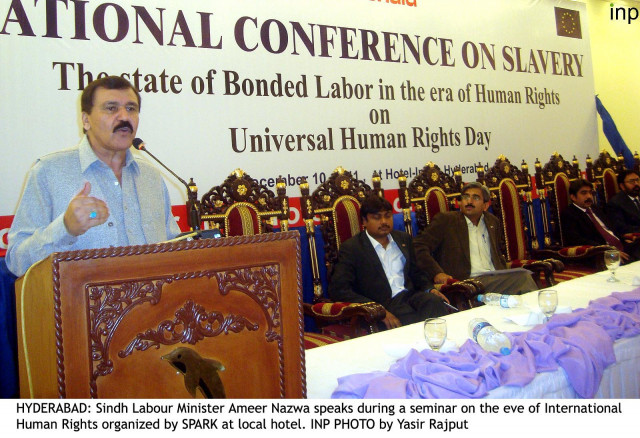Amendment in law soon: Workforce in informal sectors to be given the status of labourers
Sindh labour minister admits enforcement of laws are a challenge.

The Sindh government plans to amend the recently enacted Industrial Relations Act, 2011, to grant the people who work in informal sectors the status of labourers.
Speaking at a conference here on Saturday, the provincial law minister, Ameer Nawab Khan, said that wage earners in agriculture would also thus benefit from the amendment along with the workers of the construction industry and other informal sectors.
The conference was organised by the Society for the Protection of the Rights of Children (Sparc) in connection with International Human Rights Day.
“This is regrettable to say but so far we have enacted no laws to regulate the workers of these sectors,” Khan observed.
The Sindh Assembly passed a modified IRA 2008 in June this year, setting aside many provisions of the Industrial Relations Ordinance, 2002, adopted during Musharraf’s regime.
Though the amended law expunged the provisions which undermined the independence of the trade unions and the authority of the labour courts to restore sacked workers, it omitted the informal sector workers, hence denying them the benefit extended to workers by the Employees Old Age Benefit Institution (EOBI), Sindh Employees Social Security Institution and other programmes.
Khan acknowledged that while the laws are being enacted, enforcement remains a challenge. He also regretted that even the 18th constitutional amendment has not fully been implemented. “The EOBI and Workers Welfare Fund (WWF) are now provincial subjects but still under the control of the federal government.”
The labour minister, without mincing words, accused the Pakistan Muslim League-Q and Federal Minister Khursheed Shah for impeding the transfer of subjects and the implementation of the 18th amendment.
Karamatullah Ali, the executive director of Pakistan Institute of Labour, Education and Research, questioned why the higher judiciary did not take notice of the delay in the implementation of the 18th amendment. “This is not a matter of a transfer of departments, rather it concerns some of our fundamental rights,” he said.
He cited a lack of implementation of Article 25-A of the 18th amendment, which makes education of children of up to 16 years of age compulsory and stipulates a penalty for parents who do not adhere to the law. “The implementation has twin advantages. Not only will children receive an education, but the issue of child labour will also be resolved.”
Speakers also highlighted problems faced by children involved in labour and the farm workers who are forced to work as labourers to clear their debts.
Kashif Bajeer of Sparc said the Sindh labour department has registered over 700 kilns and tens of thousands of labourers in the province but they do not get any help from the government.
“Sessi was supposed to provide them cards covering their health and education,” said Bajeer, who was one of the three members of a committee formed on the instructions of the Supreme Court to register the kiln workers. He lamented that there is also no mechanism to check exploitation of these workers.
Sparc’s executive director Arshad Shah recalled that Rs100 million were earmarked by the federal government for the rehabilitation of freed bonded labourers but only Rs37 million could be used and the rest of allocation lapsed.
“After the 18th amendment, the provincial governments were supposed to maintain the rehabilitation fund. But this has not happened,” he said.
He pointed out that Sindh government has also not adopted the Employment of Children Act of 1991 which the government of Punjab has already done, though without bringing it at par with the International Labour Organisation standards.
Published in The Express Tribune, December 11th, 2011.


















COMMENTS
Comments are moderated and generally will be posted if they are on-topic and not abusive.
For more information, please see our Comments FAQ